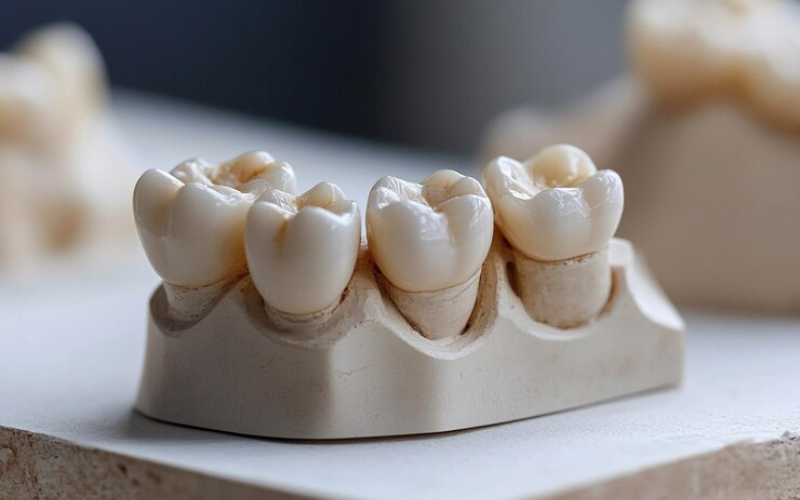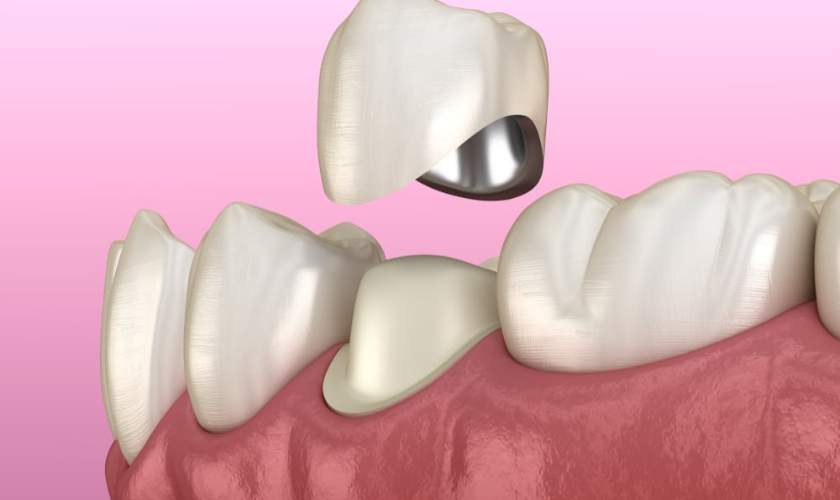Kentwood, MI

What Are The Indications For Dental Crowns?

Dental crowns are one of the most versatile restorative treatments in modern dentistry. They are custom-made caps that fit over teeth, offering protection, restoration, and aesthetic enhancement. Whether due to damage, decay, or cosmetic concerns, dental crowns provide solutions for various oral health issues. This blog will explore the key indications for dental crowns and their crucial role in protecting your smile.
What’s a Dental Crown Again?
A dental crown is a protective cover that fully encases a damaged or weakened tooth. It restores the tooth’s strength, shape, and function while also improving its appearance. Made from materials like porcelain, ceramic, metal alloys, or composite resins, crowns are custom-fitted to blend seamlessly with the rest of your teeth.
Indications for Dental Crowns
Crowns are recommended for a range of dental problems. Here are the most common indications for dental crowns:
1. Protecting a Weak or Cracked Tooth
- Weak tooth structure: Teeth weakened by decay or previous large fillings are prone to fracture. A crown can reinforce and protect these teeth from further damage.
- Cracked teeth: Small cracks in a tooth can gradually worsen, causing pain and leading to tooth loss. A crown covers the crack, distributing chewing forces evenly to prevent worsening.
2. Restoring a Broken or Severely Worn Tooth
- Broken teeth: Teeth can break due to trauma, biting into hard objects, or accidents. A dental crown restores the broken tooth to its original shape and function.
- Severely worn teeth: People who grind their teeth (bruxism) or suffer from acid erosion often experience significant wear. Crowns can rebuild the structure and prevent further deterioration.
3. After Root Canal Therapy
- Post-root canal: Root canal treatment leaves a tooth hollow and more susceptible to breakage. Placing a crown over the treated tooth offers protection and restores its function.
- Prevention of future fractures: A crown placed after a root canal prevents stress fractures, ensuring the longevity of the treated tooth.
4. Supporting a Dental Bridge
- Anchor for dental bridges: Crowns are commonly used to anchor dental bridges. When you lose a tooth, the adjacent teeth need reinforcement to support the bridge. Crowns provide that stable foundation.
- Preventing shifting of adjacent teeth: Dental crowns on abutment teeth prevent shifting, helping to maintain proper alignment and bite.
5. Cosmetic Enhancement
- Aesthetic improvements: Crowns can be used to cover discolored or misshapen teeth. When traditional whitening methods or veneers aren’t effective, a crown can provide a more permanent solution.
- Improving smiles: Dental crowns are often used in smile makeovers, giving a uniform, natural appearance to damaged or irregularly shaped teeth.
6. Large Fillings That Makes The Teeth Weak
- Protection for large fillings: Teeth with large fillings are structurally weaker and prone to fractures. A crown covers the entire tooth, ensuring the restoration is well-supported and secure.
- Longer-lasting solutions: Crowns provide a long-term solution compared to traditional fillings, especially for teeth that endure heavy chewing forces.
7. Dental Implants
- Crowning dental implants: Dental implants, which act as replacement roots for missing teeth, are completed with a crown on top. The crown restores the appearance and function of the missing tooth.
- Permanent tooth replacement: Dental crowns on implants provide a durable, natural-looking replacement for missing teeth, prevent bone loss and maintain oral health.
The Dental Crown: What To Expect In The Whole Process?
If your dentist determines that a dental crown is the best solution for your condition, here’s what you can typically expect during the procedure:
- Tooth Preparation: The dentist reshapes the damaged tooth to make space for the crown. This process may involve removing decayed or damaged parts of the tooth.
- Impressions and Design: The dental team takes impressions or digital scans to create a model of your tooth. They custom-design the crown to fit perfectly over your tooth.
- Temporary Crown: The dentist places a temporary crown while the dental lab crafts your permanent crown. This temporary crown protects your tooth and ensures proper function in the meantime.
- Final Placement: Once your permanent crown is ready, the dentist will cement it in place after ensuring the fit and color match your other teeth.
The Advantages Dental Crowns Carry
Dental crowns offer numerous benefits, both functionally and aesthetically:
- Restored Strength: Crowns strengthen weak or damaged teeth, allowing you to chew and speak normally.
- Long-Lasting Solution: With proper care, dental crowns can last anywhere from 10 to 15 years or longer.
- Natural Appearance: Crowns, particularly those made of porcelain or ceramic, can match the color of your natural teeth, providing a seamless appearance.
- Protection Against Further Damage: Crowns encase the entire tooth, offering protection against wear, decay, and breakage.
- Custom Fit: Each crown is custom-made to fit your tooth perfectly, ensuring comfort and functionality.
Taking Care of Your Crowns
Once you have your crown, it’s essential to maintain good oral hygiene to ensure it lasts as long as possible. Here are some tips:
- Regular brushing and flossing: Clean around the crown just as you would your natural teeth. Pay special attention to the area where the crown meets the gumline to avoid plaque buildup.
- Avoid chewing hard objects: To prevent damaging your crown, avoid chewing on ice, hard candy, or other tough objects.
- Visit your dentist regularly: Routine dental check-ups allow your dentist to monitor the condition of your crown and address any issues early.
Dental crowns offer a versatile solution for various dental problems, from protecting weak teeth to enhancing the appearance of your smile. Their ability to restore both function and aesthetics makes them an indispensable tool in modern dentistry. If you have a damaged, weakened, or cosmetically unappealing tooth, a dental crown may be the perfect solution for you.
With proper care, a well-placed crown can last many years, giving you the confidence to smile, eat, and speak without hesitation. Consult your dentist to see if a dental crown is right for you and enjoy the benefits of a healthy, protected smile.
This blog aims to give patients valuable insights into why and when they should use crowns. If you’re considering a dental crown, now you know just how effective and reliable this treatment can be!




